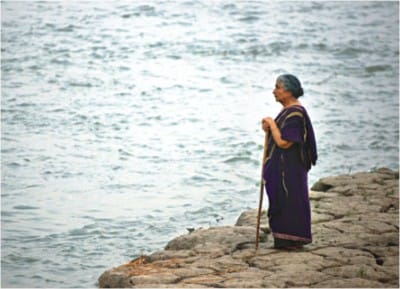Waiting to be free of religious militancy

The film shows how violence in the name of religion can destroy individuals and families.
After dealing with socio-economic and moral issues in his previous two award-winning movies “Nirontor” and “Rupantor,” Bangladeshi independent filmmaker Abu Sayeed is back with his next feature film -- this time dealing with the subject of the threat of terrorism.
The film, starring veteran actors Jayanto Chattopadhyay and Mirana
Zaman, among others, is aptly titled “Opekkha” (Waiting).
The story of “Opekkha” revolves round Rabiul and Ranju, two young men belonging to families living in different districts of Bangladesh. Rabiul, 28, lives in Dhaka pursuing his education and enjoying his passion for singing. He lost his parents at an early age and has his grandmother as his only close relative who lives in their village home. His grandmother has a problem of forgetting things easily.
On the other hand, Ranju, 23, studies science at a government college in a district town. Ranju gets involved with 'Harkatul Jihad,' a terrorist group and at the instance of his outfit carries out a bomb blast in Dhaka in which several people are killed including Rabiul who was passing by at that time.
A few days after the attack, the police raid Ranju's house where his parents are shocked to learn that their son is a member of the terrorist group. Ranju's father goes to the college in search of his son but fails to locate him.
Rabiul's grandmother forgets his grandson's death and begins writing letters to him. As she receives no answer, she becomes restless waiting for him and even goes to the bus stop hoping to meet him.
The 48-year-old Sayeed told The Daily Star over phone, “The families of the two main characters, Ranju and Rabiul, are victims of religious militancy. They share the same crisis. Waiting shows how violence in the name of religion can destroy individuals and families, bringing nothing but suffering and death to the innocent. People want an end to such violence.
“Waiting is thus not only about a grandmother waiting for her grandson or parents waiting for their son's return but on a larger canvas is also about the long wait of the people for an end to religious militancy.”
To make a film with terrorism as the subject was perhaps on the cards for Sayeed, who says he has seen a “spurt in religious militancy” in
Bangladesh ever since an attack on cultural group Udichi Shilpi Goshthi left several people dead in Jessore in 1999.
“The majority of Bangladeshis do not support such terrorist activities. The current political leadership and the civil society are all against any form of religious militancy. Still, militant groups continue to gain strength and organise themselves. Their covert operations still continue,” said Sayeed adding, “Opekkha” has been set against the background of this worrisome reality.
What is more worrisome for Sayeed is that Ranju the extremist is not a product of madrassa (religious school) system but is a science student drawn into religious militancy by otherworldly promises. On the other hand, Rabiul is an average Bangladeshi youth who represents all those innocent victims of bomb attacks and other forms of violence.
Sayeed believes “the mindless terror attacks by the militant groups are politically motivated.”
“Religious militancy that Bangladesh is facing now is not only masterminded by a few religious parties but is also linked with international politics. It does not reflect Islamic values but is solely used to gain a political base,” said the director.
Barring Chattopadhyay and Mirana Zaman, the rest of the cast of “Opekkha” comprises young theatre and television actors.
“I have done this keeping in mind the subject of the film and not the budget,” said Sayeed, who has produced “Opekkha” under the banner of his production house Aangik.
The auteur said that “Opekkha” is set for commercial release in Bangladesh in September this year.

 For all latest news, follow The Daily Star's Google News channel.
For all latest news, follow The Daily Star's Google News channel. 



Comments